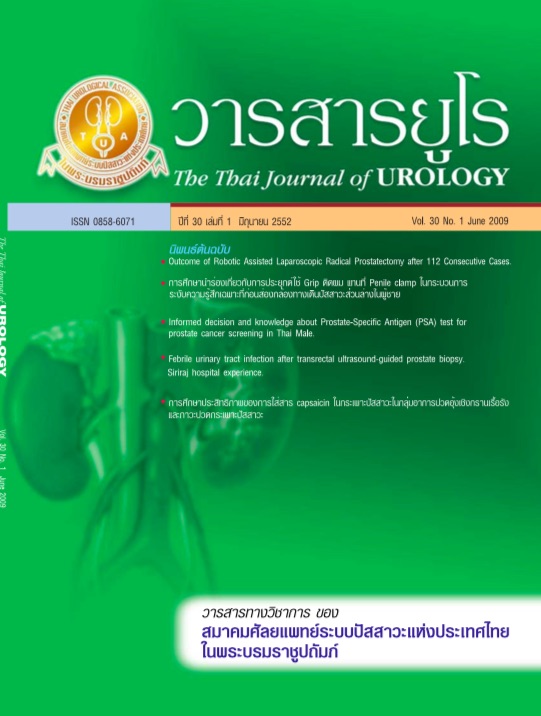Informed decision and knowledge about prostate-specific antigen (PSA) test for prostate cancer screening in Thai Male
Keywords:
Informed decision, knowledge, prostate-specific antigen, prostate cancer, screening, Thai MaleAbstract
Objective: To assess menûs informed decision and knowledge of the PSA test for prostate cancer screening in Thai male.
Subjects and Methods: We use the constructed questionnaire evaluate 80 Thai males, aged 35-78 years who had a reported PSA tests and attended urological outpatient unit of King Chulalongkorn Memorial hospital, we exclude subject had a prior diagnosis of prostate cancer or had ever undergone prostate biopsy before. Men who received a PSA test for reasons other than screening were excluded.
Results: Overall 73.75% didnût understand why the test was being done, 43.75% understand that çPSA test is screening toolé. Only 16% were informed about potential of false positive and false negative of PSA , and 8.75% were informed about further management (transrectal biopsy) if the result of PSA test is abnormal, 6.25% understand the drawback of PSA test such as unnecessary biopsy. Four men aged under 45 years without prostate cancer risk had PSA test in their check up program.
Conclusion: Informed decision and knowledge about PSA such as benefit and harms, the limitations of PSA testing, the consequence of a positive test result had been deficient in Thai male. Informed and shared decision should become the promoting issue in public health.
References
Arcangeli CG, Ornstein DK, Keetch DW. Postate-specific antigen as a screening test for prostate cancer: the United States experience. Urol Clin North Am 1997; 24: 299-306.
Chan ECY, Vernon SW, OûDonnell T. Informed consent for cancer screening with prostate-specific antigen: how well are men getting the massage? Am J Pub Health 2003; 93: 779-85.
Katz DA, Jarrard DF, Mchorney CA. Health perceptions in patients who undergo screening and workup for prostate cancer. Urol 2007; 69: 215-20.
Draisma G, Boer R, Otto SJ. Lead times and overdetection de to prostate specific antigen screening: estimates from the European Randomized Study of Screening for Prostate Cancer. J Natl Cancer Inst 2003; 95: 868-78.
Frankel S, Smith GD, Donovan J, Neal D. Screening for prostate cancer. Lancet. 2003; 361: 1122-8.
de Koning HJ, Liem MK, Baan CA. ERSPC. Prostate cancer mortality reduction by screening: power and time frame with complete enrollment in the European Randomized Screening for Prostate Cancer (ERSPC) trial. Int J Cancer 2002; 98: 268-73.
Keetch DW, Catalona WJ, Smith DS. Serial prostatic biopsies in men with persistently elevated serum prostate specific antigen values. J Urol 1994; 151: 1571-4.
Schroder FH, Habbema DF, Roobol MJ, Bangma CH. Prostate cancer in the Swedish section of ERSPC-evidence for less metastases at diagnosis but not for mortality reduction. Eur Urol. 2007; 51: 588-90.
Gohagan JK, Prorok PC, Hayes RB, Kramer BS. The prostate, lung, colorectal and ovarian (PLCO) cancer screening trial of the national cancer institue:history, organization, and status. Control Clin Trials 2000; 21: 251S-72S.



